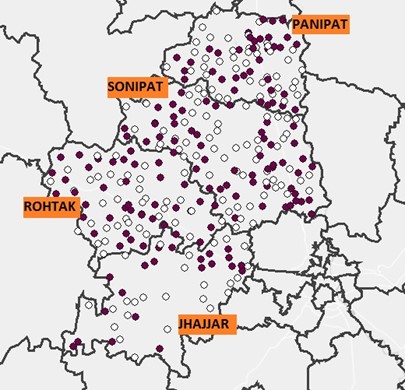Despite India's recent rapid economic growth and social transformation, women and girls lag behind men and boys in many domains. For example, 23% of adult women work in India compared to more than 80% of men. Not just a phenomenon specific to rural areas or among the less educated, gender imbalances manifest themselves even in business schools and among the management ranks of top firms! These facts suggest that economic development alone seems unlikely to achieve gender equality, as many gender gaps persist despite economic progress.
Underlying this gender inequality are regressive attitudes about gender roles and about the importance of equal opportunities. For instance, surveys reveal that while many back "equal educational opportunities for boys and girls," they simultaneously argue that "women should be less educated than the men they marry," suggesting that social attitudes rather than the ability or ambition constrain women's advancement.
Changing deep-seated social attitudes is a challenge, especially since adults tend to be remarkably resistant to changing their views. However, there is evidence that reshaping attitudes in a more prosocial direction was possible - the election of many female panchayat leaders after the 73rd Amendment to India's Constitution improved perceptions of female leaders' effectiveness and weakened stereotypes about women's roles in the public and domestic spheres. In another domain, the expansion of cable TV in India - transmitting programmes depicting more assertive female characters - led to significant decreases in fertility, the acceptance of son preference and violence against women while increasing reported women's autonomy. In Africa, MTV's popular Shuga series, which featured educational storylines on topics such as HIV/AIDS, improved viewers' knowledge and attitudes, increased HIV testing and, among women, led to fewer sexually transmitted infections.
Would a more direct approach to change gender attitudes work, specifically targeting adolescents? Research in psychology suggests that there might be a window in the teenage years when adolescents are both curious about the opposite gender and open to changing their attitudes on social and economic roles of women vis-a-vis men. Another advantage of targeting adolescents is that gender-equal attitudes get baked in, possibly leading to more egalitarian behaviour through adulthood.

With this idea in mind, we collaborated with the Government of Haryana and Breakthrough India, a human rights NGO based in Delhi, to design and implement a curriculum on gender attitude change in secondary schools in four districts of the state (Sonepat, Panipat, Rohtak and Jhajjar, which in 2012 had some of the most skewed sex ratios in the state). A total of 150 schools were randomly selected for implementation, with 164 schools as a comparison set where only data was collected. The programme, called "Taaron ki Toli", was implemented with 7th, 8th and 9th graders and lasted two and a half years, and was led by NGO's own facilitators working within the schools. The sessions included discussions on social norms (for example, women should cook) and questioning them (why? Men cook in restaurants). The programme also included a strong communication skill component since teenagers need to negotiate their views with parents at home. Apart from discussions, participants wrote street plays on topics such as street harassment and played sports like kho-kho, with participation from both genders. The programme made both a human rights case and a pragmatic economic case for women empowerment. I wish I had a programme like this in my school days!
The programme resulted in big changes in gender attitudes right after the programme ended; these changes persisted for at least three years. Quantitatively, the programme had a 16% persuasion rate, meaning that participants changed 16% of their gender regressive views to equality-oriented ones. The attitude changes were similar for both girls and boys but with substantial differences in behavioural changes (such as interactions with the opposite gender, doing domestic chores for boys and going out to the market for girls). Compared to boys, girls reported about half the behavioural change, pointing to greater barriers girls face in translating their gender-equal attitudes into behaviour change.
One lesson from this exercise is that targeting men and boys in gender-equality interventions is important since they often have more agency in actually translating their views into change on the ground. In the context of the Haryana programme, will the biggest beneficiaries be future wives of these boys?
This experiment corroborated what researchers have been observing in many other contexts about the promise of early-life attitude changes in alleviating discrimination. One implementation could be innovation in how these programmes are delivered in future - maybe on phones, involving gamification and using the power of social networks. Another possibility is that the essential programme elements could get incorporated into standard curricula, part of the usual textbooks and taught by regular schoolteachers.
Five years after the programme ended, we continue to track participants as they enter adulthood, with some already married. Do they still have the gender-equal views and opinions they expressed at the end of the programme? How many years did women, both the female participants and the wives of men who participated much as men, study after we last saw them in 10th grade? Did they get jobs or enter college? At what age did they get married and have children? Finally, do they perceive more control and satisfaction over their lives? I am optimistic about the possibility of these youth programmes in creating a long-lasting social change!
You can find the paper at https://www.nber.org/papers/w25331

About The Author
Prof. Tarun Jain
Tarun Jain (tarunj@iima.ac.in) is an associate professor in the Economics area at the Indian Institute of Management Ahmedabad